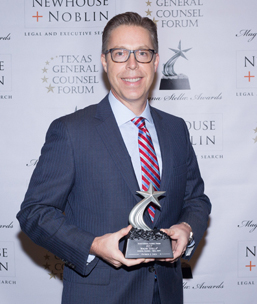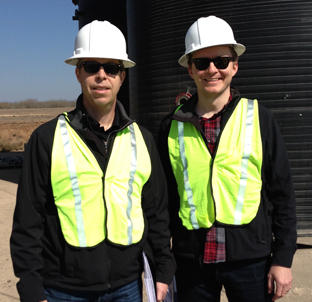
Patrick Shea has been a little busy since he joined the legal department at Waste Connections in early 2004.
He and his team have completed more than 300 business acquisitions, including two billion-dollar-plus deals. He’s presided over 10 debt financings for more than $10 billion and two equity offerings that raised $800 million. He helped engineer the waste and environmental service company’s relocation of its headquarters from California to Texas in 2012.

And last year, he headed the legal team in Waste Connection’s $5.2 billion acquisition of Progressive Waste Solutions in a highly complex, multinational transaction that doubled the company’s revenues, employee headcount, customer base and equity market capitalization. Waste Connections is now the third largest solid waste services company in North America.
“This business started 20 years ago as the result of one acquisition,” Shea told The Texas Lawbook in an exclusive interview. “The extraordinary growth has been exciting, but it also has meant a lot of work for the legal department.”
Last month, the Texas General Counsel Forum honored Shea with its 2017 Magna Stella Award for Outstanding General Counsel for a Small Legal department, which includes in-house operations with 10 or fewer lawyers. The GC Forum said that Shea “helped solidify the culture of servant-leadership and create a dynamic work environment for all employees.
“Shea leads by example and several of the attorneys in his department have received the Waste Connections Servant Leader of the Year Award,” the GC Forum stated.
Shea grew up in the suburbs of Sacramento. There were no lawyers in the family, but he enjoyed writing and excelled at debate. He competed in the high school state championships for mock trial.

After college at the University of California–Davis, he received his law degree at Cornell University.
“I’m the poster child for the fact that law can take you many places,” he said.
Shea practiced corporate and securities law in the New York and London offices of Winthrop, Stimson, Putnam & Roberts (now Pillsbury Winthrop Shaw Pittman) from 1995 to 1999. He then jumped to Brobeck, Phleger & Harrison in San Francisco, where he worked until the firm folded in 2003.
“I did a lot of high yield debt offerings and handled M&A transactions, venture financing and IPOs,” he said. “A lot of my high-tech start-up companies disappeared when the tech bubble burst. That’s when I became interested in moving in-house, especially for a company that might be more recession resistant.”
In 2003, he met the general counsel of Waste Connections after mailing him his resume.
“I liked the idea of having one public company client and being an owner through stock,” he said. “The executive team reminded me of my friends from college. They were incredibly smart and doing big things, and they seemed to be having fun while doing it.”
Waste Connections, which has the motto “work hard, play harder,” called Shea back for an interview in 2004 and he was hired as the company’s second in-house lawyer.
In February 2008, he was promoted to general counsel. Since then, he has grown the legal department from two lawyers to seven, and he seeks to another lawyers in the next couple of months.
“While the rest of the company is decentralized and spread out across U.S. and Canada, we’ve kept the legal department lean and mean and centralized,” he said. “We are about to hire a seventh U.S. lawyer and now have one lawyer in Canada.”
 “When you grow in size as a company, day-to-day legal work, including litigation, inevitably increases,” he said.
“When you grow in size as a company, day-to-day legal work, including litigation, inevitably increases,” he said.
In 2012, Waste Connections executives decided to move the company’s headquarters from Sacramento to The Woodlands.
“The company moved about 100 families from California to Texas,” he said. “It was a rewarding process to develop an incentive program to assist employees with the move.
“Waste Connections decided to relocate its headquarters first and foremost because we had expanded beyond the West Coast and it would take some managers two or three days to fly to Sacramento for meetings that often lasted only a few hours,” he said. “But I can tell you, Texas has been a very good move for the company.”
Within months of the relocation, Shea was the lead lawyer in the company’s $1.3 billion acquisition of Houston-based R360 Environmental Solutions
Then, during the Christmas break in 2015, Shea and his legal team of in-house and outside counsel started working on Waste Connections’ biggest deal yet – the $5.2 billion acquisition of Ontario-based Progressive Waste Solutions. It was an all-stock deal that gave Waste Connections shareholders a 70 percent ownership in the new combined company.
The transaction was structured as a reverse merger and allowed Waste Connections to move its tax domicile to be located in Canada.
“When we acquired Progressive, a reverse merger was a relatively simple way to structure the combined company,” he said. “It was like taking your hands and connecting them at the thumbs. Our ultimate parent company became Progressive’s parent company in Canada.”
The deal was transformative. As a result, Waste Connections’ annualized revenues jumped from $2.2 billion to more than $4 billion. Employee headcount soared from 7,500 to about 16,000. Operations expanded from 32 states to 38 states and five Canadian provinces.
“Our shares now trade on two stock exchanges – one in the U.S. and one in Canada,” he said.
The merger was announced on Jan. 19, 2016 and it closed five months later.
Others at Waste Connections say Shea is not a passive general counsel.
“Pat not only directly participated in the negotiation of the definitive acquisition agreements, he also worked closely with outside counsel on all related securities and antitrust filings,” Waste Connections Deputy General Counsel Robert Cloninger said.
“Pat has been intimately involved in the integration efforts, including the review and management of all litigation pending and threatened against Progressive Waste and its affiliates,” Cloninger said.
In the weeks following the Progressive merger, Shea interviewed lawyers from about 50 law firms who had represented Progressive in various matters.
“When the merger closed on June 1, 2016, some law firms came to meet with us and made an effort to get to know us and our business,” Shea said. “It really helped us and now we have a growing relationship with many of those firms. But there were other law firms that really made no effort to get to know us and we don’t work with them anymore. I place a lot of value on meeting outside counsel in person.
“I try to take the time to go to lunch or dinner with outside counsel to allow them to learn about their expertise and their knowledge of issues facing our industry and how they might be able to help our company,” he said. “I can safely say that I have never hired a lawyer based on his or her ranking in some publication.”
Shea said he likes to get a heads up if a lawyer doing the company’s work is leaving the firm for another law firm.
“I was just on a call about a lawyer we were using on a matter that had left the law firm, and no one at the firm had told us,” he said.
When hiring outside counsel, Shea said, “rates matter a lot.”
“I know that hiring an antitrust lawyer in New York or Washington, D.C., is likely to cost us $1,000 an hour or more, but we would not expect to pay that rate for a basic litigation matter in Texas or most other places,” he said. “We have not experimented with very many alternative fee arrangements or rate structures, but we do expect a significant fee discount from the firms we send a lot of business to.”
He said discounts range from five percent to 15 percent.
Shea says the biggest legal challenges stem from frivolous litigation, bloated bureaucracy, storm water regulation and wage and hour litigation.
Shea is not a big fan of arbitration in commercial disputes.
“My first experience in California with arbitration was fantastic,” he said. “We had a multimillion-dollar dispute handled by a retired federal judges, and it went smoothly and quickly.
An arbitration he had more recently in Texas was “a completely different story.“
“We had a three-person arbitration panel that oversaw a three-week hearing with several weeks off in between those weeks,” he said. “We felt short-changed with the ‘split-the-baby’ ruling, because the panel gave us no substantive explanation for its reasoning. The arbitration was just as expensive and time-consuming as a trial, and neither side had a right to appeal.”
Shea’s colleagues say he definitely deserved to be honored by the Texas General Counsel Forum.
“Pat has created a collegial and family-oriented atmosphere within the department that encourages attorneys and staff alike to socialize outside the office,” Cloninger said. “Pat constantly endeavors to make his department a place where people want to ‘work hard and play harder.’”
